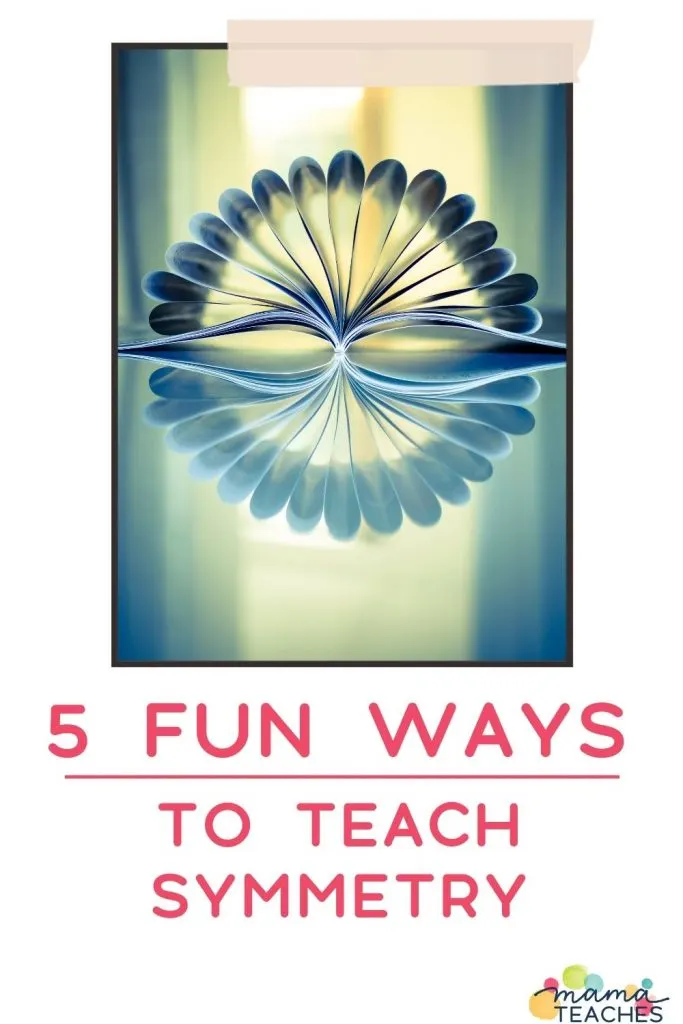Symmetry is mathematics in real life.
How do you make it fun?
We’ve got 5 awesome ways to teach symmetry to kids.

This article contains affiliate links to things that you might like.
What Is Symmetry?
An item is symmetrical if you can divide it into two identical halves.
Imagine the human face.
If you take a marker and run a straight line from your hairline down to your chin, you have evenly divided your face in half.
Each side has one eye, one ear, half a nose, and half a mouth.
The line you drew is called the line of symmetry (also called the axis of symmetry).
Each side of your face is a mirror image of the other side.
Your face is symmetrical.
Why Teach Symmetry?
Symmetry is in the world all around us: insects, starfish, sand dollars, stop signs, sunflowers, skyscrapers, butterflies…the list goes on and on.
Children gravitate toward symmetry as it allows them to see patterns and organize their world.
We create art using symmetry (Da Vinci’s Last Supper is a famous example).
We use our knowledge of symmetry to help us with spatial reasoning tasks: rotating, reflecting, or shifting objects or shapes.
Understanding symmetry is central to the study of geometry, art, chemistry, and physics.
Understanding symmetry is a gateway to higher learning!

Teaching Symmetry in 5 Fun Ways
The concept of symmetry is a joy to teach, especially when you introduce it in a fun and hands-on way.
Here are 5 ways to make teaching symmetry a hit with kids.
Reflect It
An object is symmetrical along its line of symmetry if both sides are mirror images of each other.
What better way to teach that concept than by using an actual mirror?
These small plastic mirrors are inexpensive and safe for kids to use (no brittle glass).
Simply take a photo or a drawing of a real-life symmetrical object (e.g., ladybug, butterfly, toothbrush, etc.) and place the mirror vertically along the line of symmetry.
Can you see the image when you look in the mirror?
It should look exactly like a real ladybug.
If so, the object is symmetrical and you have found its line of symmetry.
You can use the mirror test to see if something is not symmetrical as well.
Hold the mirror up to a picture of a letter r or p, a picture of a house with one side that’s larger than the other, or a lumpy potato.
Those items are asymmetrical.

Stamp It
Fold a piece of paper in half.
Have children draw a line starting from the fold, gently bending and curving on its way, and then ending back on the fold somewhere.
The simpler the curved line the easier this will be.
Then get a Q-tip and some paint (the thicker and goopier the better).
Trace the line with the gloppy paint.
Then fold the paper in half like a taco, paint side in.
Press the sides together.
Unfold the paper to reveal two mirror images along the fold.
The student has now created a symmetrical picture along an axis of symmetry.
Cut It
Fold a piece of paper in half and draw a line that starts and ends on the fold.
You could draw half a heart, star, rectangle, butterfly, or flower.
Then let the child cut along the line.
When she unfolds the paper, voila!
A symmetrical shape is revealed.
You can turn this shape into a fun card!

Draw It
Drawing symmetrical objects is not only great for recognizing symmetry, it is an important workout for the brain.
It’s challenging to do the exact opposite of what you see.
Practice drawing mirror images to complete a symmetrical picture.
You don’t have to create these pictures on your own.
This set of symmetrical snowflake printables is zero prep and a perfect way to chase off winter boredom.
This spring symmetry set is just as engaging; the child creates rainbows, ladybugs, butterflies (and more).
Grid It
Graph paper is a great tool to help a student draw symmetrical shapes.
Draw a bold line of symmetry in marker, then fill in half a shape along the axis (following the grid lines).
The child uses the graph lines as guides to make the mirror image and complete the symmetrical shape.

How to Teach Symmetry in a Fun Way
You don’t have to teach symmetry and watch your kids’ eyes glaze over.
These 5 fun ways to teach symmetry are hands-on and engaging.
Try one or all to make this math concept spring to life!
Symmetry is everywhere!
